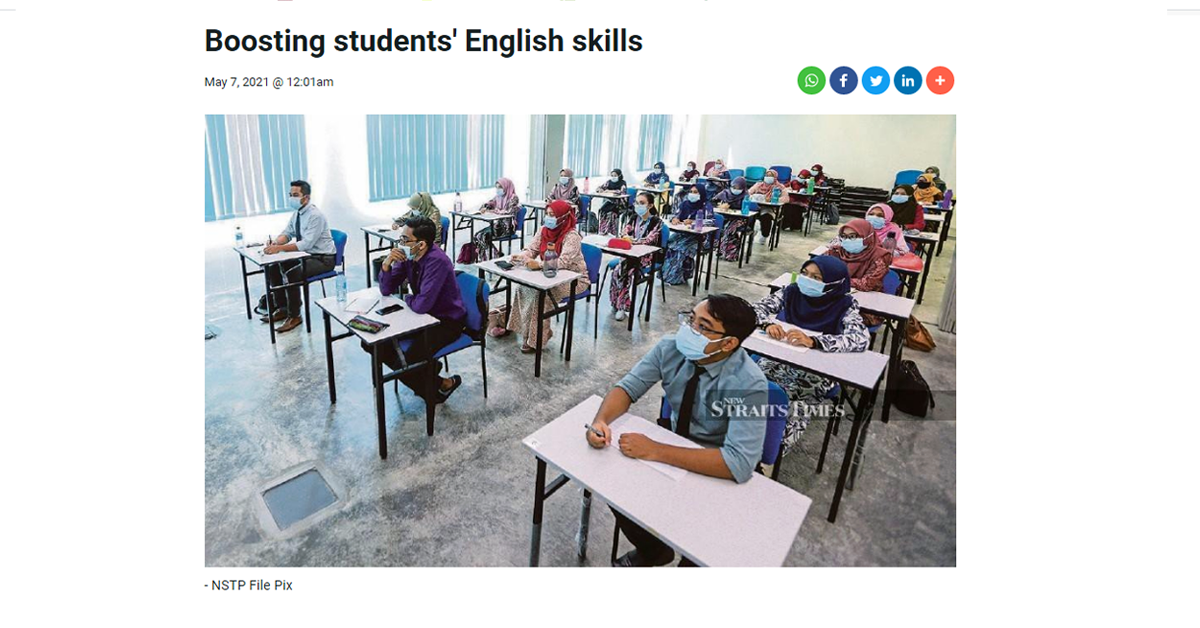
LETTERS: Are our universities accepting students with poor English proficiency?
It is said that people who got an A1 in English in the 1970 or 1980s have a far better command of English than those who obtained an A1 or A2 today.
As a product of the late 1970s myself and being in academia, I can attest to this disparity.

Despite this, grades are the main criteria for entrance into university. Many educationists lament the declining English standard among teachers, and many also say it is because Malay is the medium of education.
The teaching of Mathematics and Science in English in the early 2000s was a sign of language and education policies shifting for pragmatic reasons.
I appreciate the rationale for the policy since it provides a gateway to new frontiers in technology and digital transformation.
Our efforts to be on a par with those who are ahead of us will someday be achieved.
The role and status of Malay is unquestionable. But in a competitive world, being monolingual is a disadvantage.
Some people I know have been offered positions with local and international companies because of their ability in Malay and English.
We need to give this policy our support.
A case in point is a request made by a student: “Doctor, I will come to your office at nine o’clock sharp tomorrow morning. Wait for me if I am late. Make sure you are in by nine, okay?”
Many would think the tone was inappropriate between a 20-year-old undergraduate and a baby boomer lecturer in a formal setting.
But I calmly guided her and stated that I was pleased that she was concerned about her performance. I agreed to see her and was there waiting at 9am. I was even prepared to wait if she was late.
Why? Because I knew she did not mean to be rude.
Like many students, she has what is commonly referred to as grammatical competence (sentence is in good English overall), but lacks pragmatic competence (the ability to use English in a socially and culturally appropriate manner).
In many universities, the battle to win the war with grammatical competence can sometimes take precedence due to a lack of basic proficiency.
But with time and commitment by teachers and students, both can be achieved.
I am optimistic about knowledge transfer through English, if need be as well as from other languages, but in the quest to improve communication skills in English, I am rather pessimistic that only learning English through Mathematics and Science can bring about pragmatic competence.
This only comes from a healthy diet of reading in English, and not simply newspapers or magazines, but literary works that can teach how language can convey ideas, emotions and attitudes.
I end this article with another example from a student requesting a time out during a two-hour tutorial: “We are feeling mentally tired. Give us a break.”
And so, I did, quietly reminding myself to correct the student after the interlude.
There is, however, another issue affecting their performance, one that works in collaboration with low proficiency and inadequate analytical skills, or reading comprehension skills.
In the process of understanding a text, comprehension skills are vital for the successful application of theories to real-life data. The famous educator Edward Thorndike, summed it up aptly: “Understanding a paragraph is like solving a problem in mathematics. It consists in selecting the right elements of the situation, putting them together in the right relations, and also with the right amount of weight or influence or force for each.
“The mind is assailed as it were, by every word in the paragraph. It must select, repress, soften, emphasise, correlate and organise, all under the influence of the right mental set of purpose or demand.”
The difficulty many students face in the initial process of identifying themes and inferences presents an obstacle that should have been tackled in primary and secondary school. Indeed, there are students who have a good proficiency in English, but are still hampered by their lack of comprehension skills.
And, conversely, there are students with lower proficiency skills, who, because of their better reading comprehension skills, are able to reflect their understanding of the text in written work. There is a body of literature suggesting that the task of improving such skills requires a change in the curriculum.
The four essential competencies — reading, listening speaking and writing — need due emphasis as separate components in the syllabus to give students the opportunity to develop each skill in a thorough manner. In-class exercises to develop analytical thinking must be encouraged at the same time.
But saying all this is easy. Sometimes, the answers are apparent to those in education, but unless it is possible to increase the number of trained teachers, to heighten parental involvement and to improve infrastructure, we will just have to do the best we can in our present condition. This seems to be the reality.
Source: News Straits Times

+6011-5413 6141 [WhatsApp] | +603-2730 7030 [Sales & Marketing] |
+603 2730 7000 | +603 2730 7070 |
crm@unirazak.edu.my | info@unirazak.edu.my